 Petzlover
Petzlover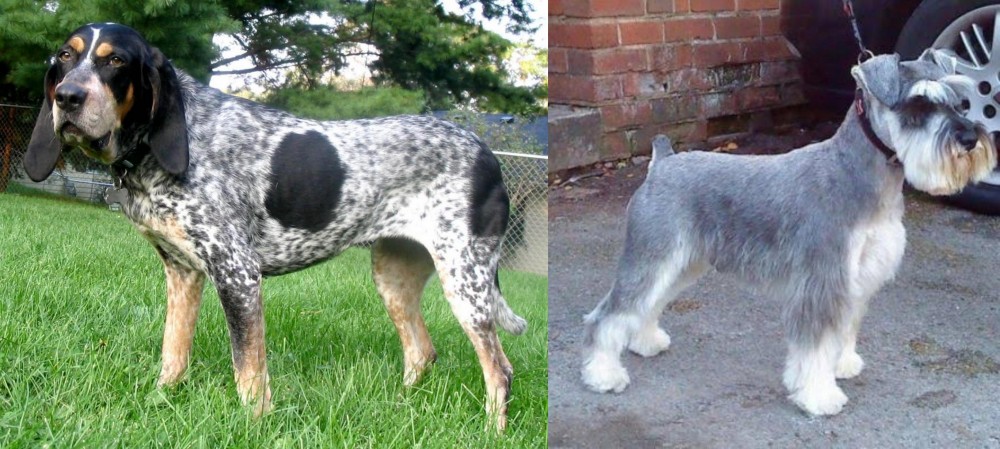 Griffon Bleu de Gascogne is originated from France but Miniature Schnauzer is originated from Germany. Griffon Bleu de Gascogne may grow 21 cm / 9 inches higher than Miniature Schnauzer. Griffon Bleu de Gascogne may weigh 17 kg / 38 pounds more than Miniature Schnauzer. Griffon Bleu de Gascogne may live 3 years less than Miniature Schnauzer. Both Griffon Bleu de Gascogne and Miniature Schnauzer has almost same litter size. Both Griffon Bleu de Gascogne and Miniature Schnauzer requires Moderate Maintenance.
Griffon Bleu de Gascogne is originated from France but Miniature Schnauzer is originated from Germany. Griffon Bleu de Gascogne may grow 21 cm / 9 inches higher than Miniature Schnauzer. Griffon Bleu de Gascogne may weigh 17 kg / 38 pounds more than Miniature Schnauzer. Griffon Bleu de Gascogne may live 3 years less than Miniature Schnauzer. Both Griffon Bleu de Gascogne and Miniature Schnauzer has almost same litter size. Both Griffon Bleu de Gascogne and Miniature Schnauzer requires Moderate Maintenance.
 The Griffon Bleu de Gascogne dog hails from France and is descended from crosses between the Bleu de Gascogne as well as the Griffon Nivernais. Dog experts tell us that the Grand Griffon Vendeen is also part of the mix.
The Griffon Bleu de Gascogne dog hails from France and is descended from crosses between the Bleu de Gascogne as well as the Griffon Nivernais. Dog experts tell us that the Grand Griffon Vendeen is also part of the mix.
Raised as working dogs, with his good nose and alertness, he has always been used as a single hunting dog or being used as part of a pack.
It was in 1920 that the first Griffon Bleu de Gascogne breed standard was written in France, and over the decades, the dog hasn’t changed much in looks except that it is slightly taller.
This is a rare breed not much seen outside of France, but breeding attempts have taken it from ‘close to extinction’ to a popular pet today.The Griffon Bleu de Gascogne was recognized by the United Kennel Club in 1991.
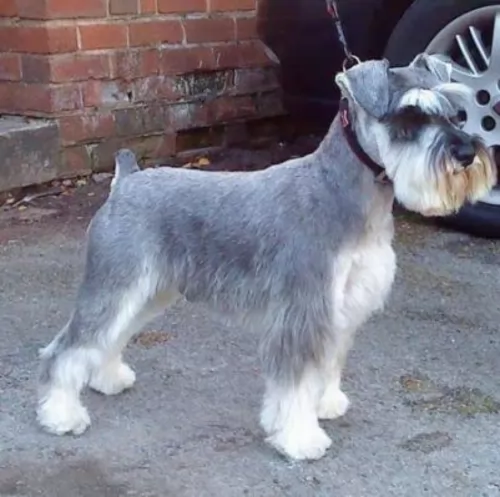 Miniature Schnauzers were first bred in Germany in the 19th century being bred from Affenpinschers and Standard Schnauzers.
Miniature Schnauzers were first bred in Germany in the 19th century being bred from Affenpinschers and Standard Schnauzers.
This dog was always used to control rats on farms, but these days he is more a companion. It is believed that the start of the modern Miniature Schnauzer in the United States was around 1924 when dogs were imported from Germany.
It was in 1933 that the Miniature Schnauzer was recognized by the AKC as a separate breed from the Standard Schnauzer.
 This is a medium to large sized scenthound. He stands at anything between 48 to 57cms and weighs between 16 and 27kg.
This is a medium to large sized scenthound. He stands at anything between 48 to 57cms and weighs between 16 and 27kg.
He has a long, wiry type of coat which is usually a mottled white and black, taking on a blue hue look. There are tan marking above the eyes and around the muzzle. The ears of the dog are long and floppy, he has that typical soulful look in his brown eyes and the tail is long with a curve at the point.
The Griffon Bleu de Gascogne is an intelligent dog breed, capable of learning quickly and therefore will do well with training and socialization.
This popular docile dog gets on well with other pets in the home as well as with children. He is alert and energetic but is known to be a loyal and loving dog, being good with children, particularly those he grew up with.
The dog isn't particularly well suited to city life simply because of his high energy. He will require a good deal of exercise, so essentially he needs a home with a fair sized garden. He will want to join you on your walks. Walks provide your pet with stimulation and are good for socializing a dog too.
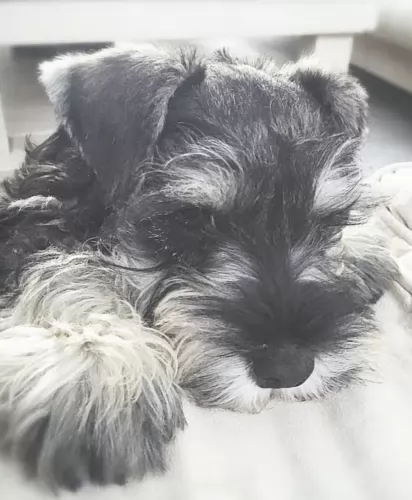 The Miniature Schnauzer is a small dog breed that stands between 30 to 36cm in height and weighs between 5 and 10kg.
The Miniature Schnauzer is a small dog breed that stands between 30 to 36cm in height and weighs between 5 and 10kg.
He has a sturdy body with a dense, wiry coat which most people prefer to have stripped. Because stripping is quite tedious, many of these dog owners prefer to have the coat clipped which actually gives the coat a greyish look to it.
The coat is usually a mix of black and silver. Some people refer to the Miniature Schnauzer as having a salt-and-pepper coat – hairs that are a mix of black and white. The dog has a double coat with the outer coat being wiry and the undercoat being a lot softer.
This is a dog that will need to be groomed frequently to prevent matting. A noticeable feature with these dogs is the rectangular shaped head with alert slanted eyes and bushy eyebrows, mustache and beard. In fact the word ‘Schnauzer’ means beard or muzzle.
The ears have been traditionally cropped but these days they are left and then they tend to be half-erect, half-floppy.
This is a tough little dog, fearless, cheeky, arrogant, alert and also friendly. A draw-card with him is that he is considered as a low-shedder and being hypoallergenic.
They’re very intelligent dogs too and will learn quickly when you give him training and socialization. This is important for a dog like this as he can quickly show you that he is strong willed and independent. Training and socialization makes him much nicer as he becomes more balanced and obedient.
He is full of life and extroverted and you can count on him to join you wherever you are and whatever you’re doing. Whether watching TV, swimming or hiking, he’ll be there and turn every occasion into a festive event. He is a loving, loyal dog, making a splendid pet.
He's protective of his human family and tends to be suspicious of strangers, and this is what makes him such a great watchdog.
 Your Griffon Bleu de Gascogne is such a popular pet in France and Spain simply because he is so amicable, getting on well with everyone in the home.
Your Griffon Bleu de Gascogne is such a popular pet in France and Spain simply because he is so amicable, getting on well with everyone in the home.
He is everything that a pet lover wants – loving, protective, friendly and companionable. They get on well with other pets too and they’re easy to train, becoming super obedient. Add to that the fact that he isn’t a sickly dog and is also fairly low maintenance.
This dog has all it takes to make him the most splendid pet.
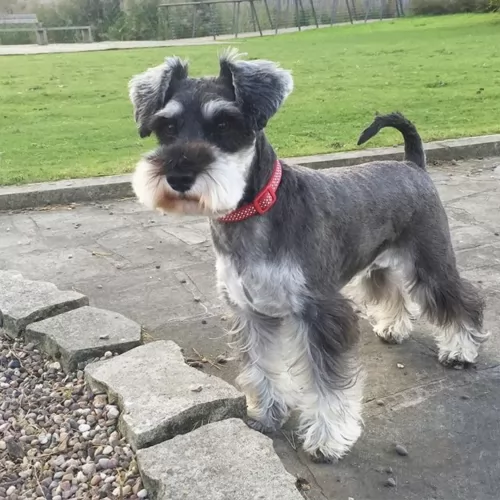 Miniature Schnauzers are such adaptable little dogs, quite happy to make a home with you in the city or in the countryside.
Miniature Schnauzers are such adaptable little dogs, quite happy to make a home with you in the city or in the countryside.
They’re sociable dogs, so just being with his human family wherever they are will suit him well. If he lives in the city however, he will need to have a walk everyday or taken to the park for a run.
He is also a dog that scarcely sheds, so he suits people battling with allergies. With an average life expectancy of 12 to 14 years, if you nurture your Mini Schnauzer and give him the best food and exercise there is, as well as loving him, you’re going to have a loyal and devoted pet.
 As a healthy dog breed, your Griffon Bleu de Gascogne isn't likely to cost you much at the vet. Nonetheless there are some common dog ailments that you need to be aware of.
As a healthy dog breed, your Griffon Bleu de Gascogne isn't likely to cost you much at the vet. Nonetheless there are some common dog ailments that you need to be aware of.
Some dog owners, when buying a Griffon puppy, want to see health clearance certificates to show that the parents of the puppy are free from the like of certain diseases such as hip dysplasia and von Willebrand's disease.
This is a condition where your dogs thighbone doesn't fit properly into the hip joint. Your puppy can develop this condition from 4 months of age already.
With some dogs you can see the pain, and they may even become lame in one or both back legs. Hip dysplasia is hereditary, but environmental factors such as an injury or the wrong diet can contribute towards your pet succumbing to hip dysplasia.
A skin allergy can make your pet totally miserable as they lick and scratch with discomfort, pain and irritation. All the scratching and licking can cause secondary infections and your pet can even lose his hair.
Atopic Dermatitis is when your dog is allergic to things like dust or pollen. Some people look at homeopathic treatments for dogs and are pleased with the results. The thing is you need to get help for your pet as it can cause your pet endless misery.
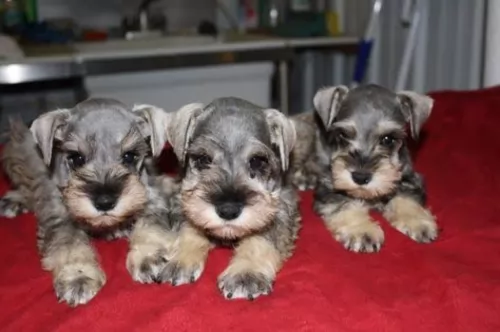 Your Miniature Schnauzer is pretty healthy and he isn’t likely to cost you much in terms of vet fees. There are however some common dog problems that you want to be aware of such as cataracts of the eye and hypothyroidism.
Your Miniature Schnauzer is pretty healthy and he isn’t likely to cost you much in terms of vet fees. There are however some common dog problems that you want to be aware of such as cataracts of the eye and hypothyroidism.
This a a problem in the lens of the eye. The lens should be clear, and when a dog has a cataract, it obscures the vision. The size of the cataract can lead to blindness.
Diabetes in a dog can bring on cataracts as can genetics or damage to the eye from exposure to ultraviolet light. Fortunately, dogs with cataracts can still see. Dogs with old cataracts can have surgery to remove them.
When a dog owner suspects a cataract in their pet’s eye it is best to treat it immediately with anti-inflammatory dog cataract eye drops. Cataracts never go away however without surgery.
The thyroid gland in the neck produces a hormone called thyroxine. It controls metabolism, but with hypothyroidism, enough of the hormone isn’t made. Its a common disease which affects all dog breeds.
Signs of hypothyroidism include hair loss, weight gain, intolerance to cold and a troublesome skin. To have the disease diagnosed, the vet will do a series of blood tests.
 The Griffon Bleu de Gascogne is a rough, shaggy, fairly long coated dog and is an average shedder. He will therefore require regular brushing to get rid of grass and burrs that cling to the hair, causing it to matt and tangle.It's always a good chance for you to check him over for ticks and fleas too.
The Griffon Bleu de Gascogne is a rough, shaggy, fairly long coated dog and is an average shedder. He will therefore require regular brushing to get rid of grass and burrs that cling to the hair, causing it to matt and tangle.It's always a good chance for you to check him over for ticks and fleas too.
He has floppy ears, so these will require cleaning to prevent infections. Check his nails too and trim them as needed. Take him to the vet for this if you're not sure how or you don't have the correct grooming tools.
Just like his human family, a dog needs to have his own sleeping spot – a place which is warm and dry and which he can retreat too. It is a good idea to train your dog to sleep in his own place where there are some warm blankets which are clean and comfortable for him.
You chose to bring a dog into your home, and it is therefore your responsibility to see that he is looked after well.
To keep him healthy, he will require high-quality kibble twice a day. How much your Griffon eats will depend on his age and his activity levels. Follow the feeding directions carefully on the packaging to ensure you keep him in good shape.
Remove the boredom of the same food every day by adding in some raw meat as well as cooked chicken, rice and vegetables as a tasty treat. This will keep him alert, healthy and his coat shiny. Fresh, cool water should be constantly available.
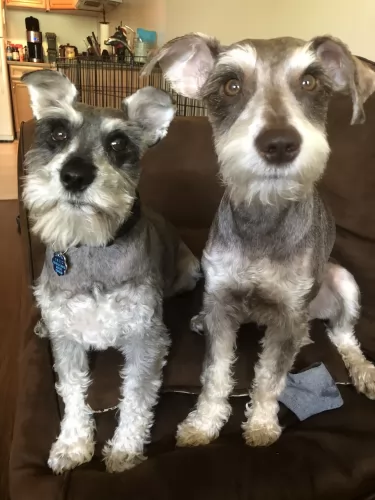 Let’s look at several ways you need to care for your Miniature Schnauzer -
Let’s look at several ways you need to care for your Miniature Schnauzer -
Make sure you have his puppy injections on time. This means knowing which veterinarian you’ll use. Later on if you don’t want to go in for breeding, you will need to have your pet spayed or neutered.
Make sure you have a nice warm, dry spot for your dog to sleep. It can be a cardboard box, or you can buy a dog basket or sleeping platform. Make sure your pet loves it and knows he can retreat to it anytime he wants.
If he goes outside for a few hours, make sure that he has a place to lie in the shade and away from the elements.
Good food promotes good health and longevity. You can feed your pet one of the top quality commercially manufactured foods and give your pet some variety by adding in some boiled chicken, vegetables and brown rice. Some raw meat occasionally can also be excellent for your pet.